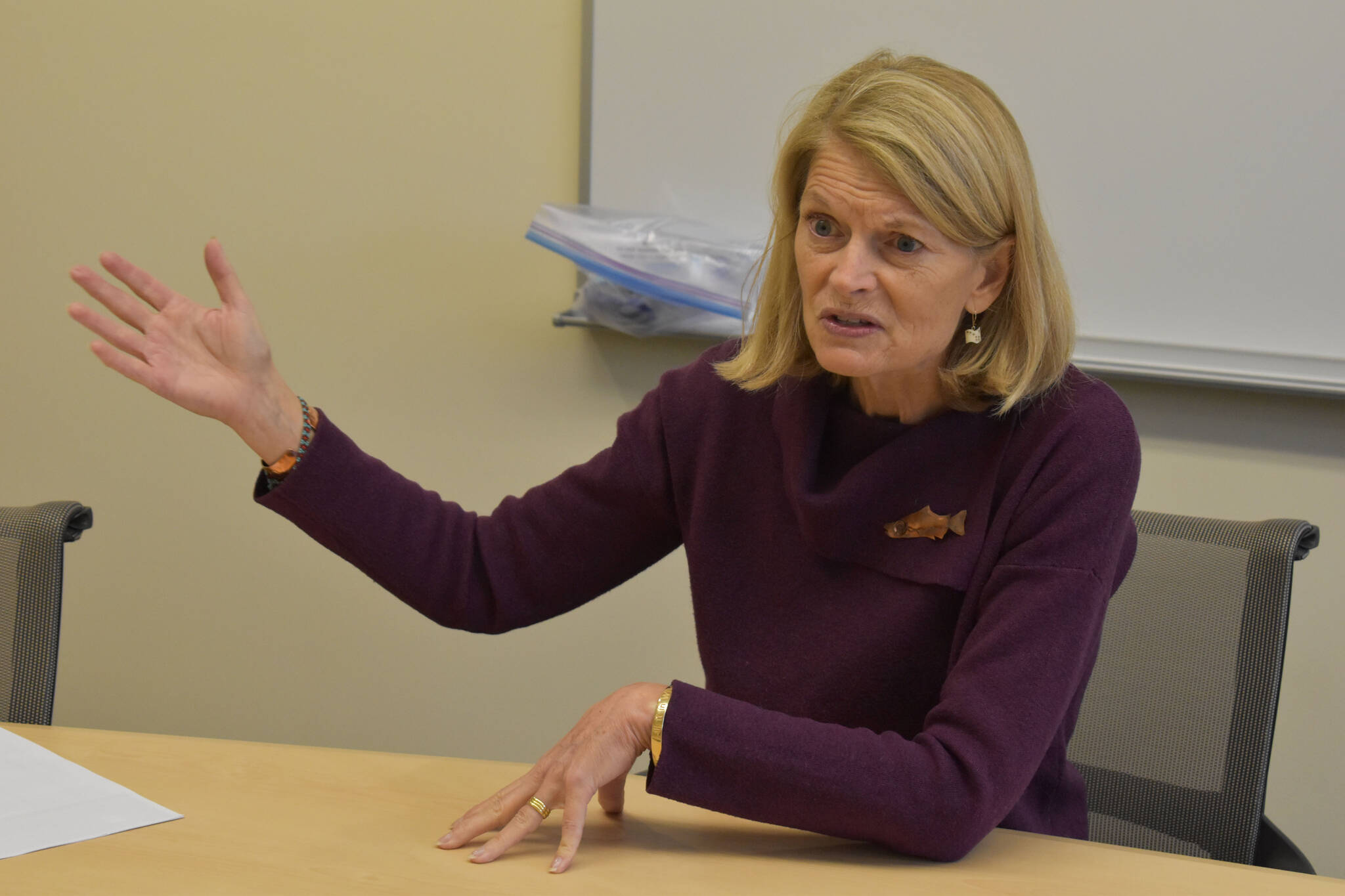U.S. Sen. Lisa Murkowski, R-Alaska, toured Kenai Peninsula College’s Kenai River Campus on Tuesday to learn more about workforce development opportunities available through the school’s programming.
Kenai Peninsula College Director Cheryl Siemers and other school leadership showed Murkowski, who is up for reelection next month, around school facilities targeted toward workforce development. Siemers reported that Kenai Peninsula College enrollment is up 17% this year, which she partially attributed to an increase in the number of middle college students taking classes through the Kenai Peninsula Borough School District.
Murkowski said workforce development is an issue that’s come up multiple times as she has traveled around Alaska and she wants to know what work is needed at the federal level to address the issue.
“As I’ve traveled around the state, I hear repeatedly, ‘We’re out of COVID now, but we can’t find anybody to come to work,’” Murkowski said. “It doesn’t make any difference what the sector is.”
In addressing the problem of workforce development, Siemers’ tour focused on the college’s vocational programs, such as Occupational Endorsement Certificates in Dena’ina and Ahtna, certifications through the Mining and Petroleum Training Service and hands-on courses in nursing and emergency medical services.
A consistent theme of Murkowski’s questioning throughout various departments was what work the college is doing to market its programs to young people on the Kenai Peninsula. Currently, KPBSD students are able to take classes at Kenai Peninsula College through the district’s middle college and JumpStart programs.
“I know that we’ve got good programs, so what can we do to get the young people to them?” Murkowski said. “Are there barriers to entry in terms of cost? If that’s the situation, let’s look at what we can be doing there.”
Murkowski and Sen. Dan Sullivan have both come out in support of the Alaska LNG Project, which would move gas from the North Slope via an 800-mile pipeline to Nikiski for export in liquid form, and in opposition to President Joe Biden’s federal student loan forgiveness program, through which some students are eligible to have up to $20,000 in federal student loan debt forgiven.
Murkowski on Monday called the Alaska LNG Project “exciting” for the Kenai Peninsula and touted the “economic drivers” she said the project would bring to the area, such as local jobs that rival those available on the North Slope.
“We’ve got so many North Slope workers who live here on the peninsula and they basically do that commute,” Murkowski said. “They work up there, they’re two on two off, they come back — and that’s great, but wouldn’t it be great if you could come home every night to your family and have good jobs here?”
Murkowski went on to say that as federal lawmakers look at higher education’s barriers to entry, she is more supportive of policies that provide longevity than those that offer temporary relief. She opposes Biden’s student loan forgiveness plan, she said, because it offers one-time relief to a finite group of people.
She said that as someone who benefited from a student loan debt forgiveness program made possible by the State of Alaska, she is empathetic to the relief Biden’s program will provide to some. However, she emphasized that the same relief will not necessarily be available to other students who may not currently qualify for the program.
“What Biden has done is he’s singled out a finite group of individuals at a moment in time and given them the benefit of this forgiveness,” Murkowski said. “It is generous and probably wonderful to them, I get it. But what does that say to the student who had worked for eight years to pay off their loans and who finally paid them off in January of this year and who worked and scrimped and saved to do just that?”
Murkowski further criticized the plan for doing nothing to address the larger problem of college affordability and said Biden’s program will not encourage higher education institutions to lower costs if they know student debt will be forgiven by the federal government.
As an alternative, she suggested reducing interest rates on federal student loans as a way to more equitably offset the burden of debt. The problem, Murkowski said, needs a broader approach.
“I’ve had so many, so many people say, ‘This is really fabulous because I’m going to be a beneficiary of it,’” Murkowski said. “I don’t doubt that and I don’t doubt that it is a relief to them, but I’m trying to think about what happens to those who are not able to take advantage of that, who have missed all these windows and were equally burdened. We haven’t done anything to help them.”
More information about the degree and certification programs offered at Kenai Peninsula College can be found at kpc.alaska.edu.
Reach reporter Ashlyn O’Hara at ashlyn.ohara@peninsulaclarion.com.

